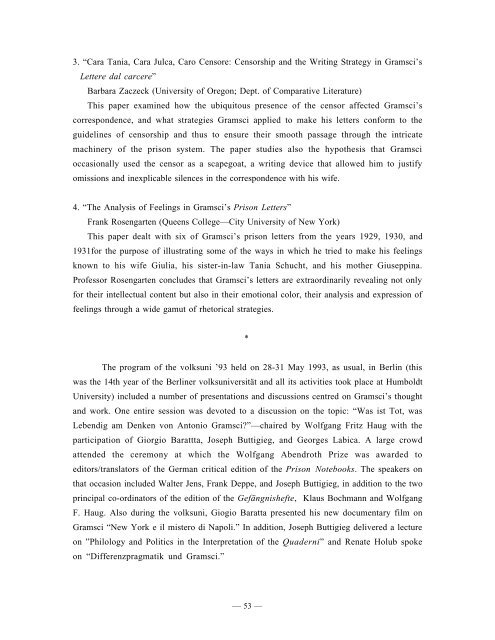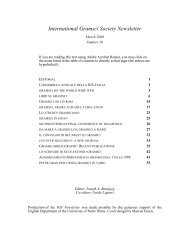Newsletter - International Gramsci Society
Newsletter - International Gramsci Society
Newsletter - International Gramsci Society
Create successful ePaper yourself
Turn your PDF publications into a flip-book with our unique Google optimized e-Paper software.
3. “Cara Tania, Cara Julca, Caro Censore: Censorship and the Writing Strategy in <strong>Gramsci</strong>’s<br />
Lettere dal carcere”<br />
Barbara Zaczeck (University of Oregon; Dept. of Comparative Literature)<br />
This paper examined how the ubiquitous presence of the censor affected <strong>Gramsci</strong>’s<br />
correspondence, and what strategies <strong>Gramsci</strong> applied to make his letters conform to the<br />
guidelines of censorship and thus to ensure their smooth passage through the intricate<br />
machinery of the prison system. The paper studies also the hypothesis that <strong>Gramsci</strong><br />
occasionally used the censor as a scapegoat, a writing device that allowed him to justify<br />
omissions and inexplicable silences in the correspondence with his wife.<br />
4. “The Analysis of Feelings in <strong>Gramsci</strong>’s Prison Letters”<br />
Frank Rosengarten (Queens College—City University of New York)<br />
This paper dealt with six of <strong>Gramsci</strong>’s prison letters from the years 1929, 1930, and<br />
1931for the purpose of illustrating some of the ways in which he tried to make his feelings<br />
known to his wife Giulia, his sister-in-law Tania Schucht, and his mother Giuseppina.<br />
Professor Rosengarten concludes that <strong>Gramsci</strong>’s letters are extraordinarily revealing not only<br />
for their intellectual content but also in their emotional color, their analysis and expression of<br />
feelings through a wide gamut of rhetorical strategies.<br />
*<br />
The program of the volksuni ’93 held on 28-31 May 1993, as usual, in Berlin (this<br />
was the 14th year of the Berliner volksuniversität and all its activities took place at Humboldt<br />
University) included a number of presentations and discussions centred on <strong>Gramsci</strong>’s thought<br />
and work. One entire session was devoted to a discussion on the topic: “Was ist Tot, was<br />
Lebendig am Denken von Antonio <strong>Gramsci</strong>?”—chaired by Wolfgang Fritz Haug with the<br />
participation of Giorgio Barattta, Joseph Buttigieg, and Georges Labica. A large crowd<br />
attended the ceremony at which the Wolfgang Abendroth Prize was awarded to<br />
editors/translators of the German critical edition of the Prison Notebooks. The speakers on<br />
that occasion included Walter Jens, Frank Deppe, and Joseph Buttigieg, in addition to the two<br />
principal co-ordinators of the edition of the Gefängnishefte, Klaus Bochmann and Wolfgang<br />
F. Haug. Also during the volksuni, Giogio Baratta presented his new documentary film on<br />
<strong>Gramsci</strong> “New York e il mistero di Napoli.” In addition, Joseph Buttigieg delivered a lecture<br />
on ”Philology and Politics in the Interpretation of the Quaderni” and Renate Holub spoke<br />
on “Differenzpragmatik und <strong>Gramsci</strong>.”<br />
— 53 —



